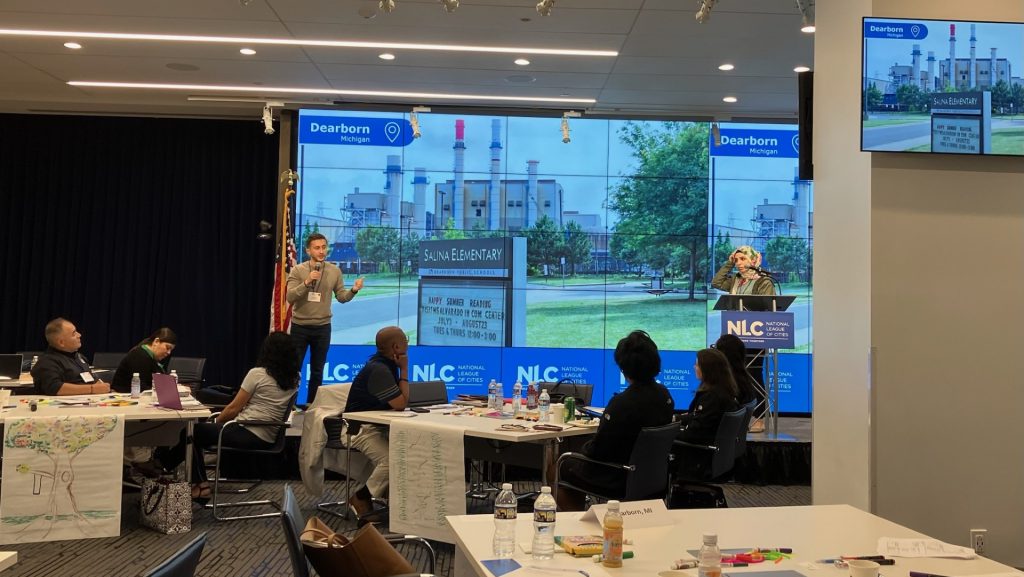Dearborn among 4 cities selected to join national environmental justice Policy Academy
Other cities selected for the program include Grand Rapids, Kansas City, Mo., and Mount Vernon, N.Y.

Ali Abazeed, founding director & chief public health officer at Dearborn Department of Public Health, shares the organization's strategies for action at the Cities of Opportunity Action Cohort.
The City of Dearborn is one of four cities selected nationally by the National League of Cities to participate in a five-month intensive Policy Academy with the Urban Institute to help city leaders develop policies on environmental justice.
Ali Abazeed is the chief public health officer and founding director of Dearborn’s Department of Public Health. He says the city is working to build sustainability plans and strategies rooted in climate resilience and environmental justice.
“We have as a department, you know, close to two years now in existence, have led on many environmental justice efforts, filing lawsuits against corporate polluters revoking certificates of Occupy and see from, you know, different sort of companies that are based in Dearborn,” Abazeed said.
He says Dearborn being invited as part of these national partnerships is a testament to the city’s vision for environmental justice.
“It’s really to learn from cities that have engaged in these processes, maybe they haven’t engaged with them in a strictly public health lens, but that have experienced developing these comprehensive strategies that their entire government is dealing with and working with. So we want to build upon that here in Dearborn,” he said.
Listen: Full interview with Ali Abazeed, chief public health officer and founding director of Dearborn’s Department of Public Health
Dearborn’s public health department was formally launched in April 2022 as the second city in Michigan to have a formal health department.
Abazeed says the health department wants to develop comprehensive plans with other city entities like economic development, parks and recreation, and police and fire.
Lourdes Aceves is director of health and wellbeing at the National League of Cities (NLC) who oversees the Cities of Opportunity and will help train city leaders for the Policy Academy. She says the focus is on environmental justice.
“We partnered with the Urban Institute to develop a new policy and systems change compass, or compasses, and that guides city officials and their partners through a series of steps toward creating policy and systems change,” Aceves said.
Aceves says that goes “from the identification and root cause analysis of the problem to developing and then selecting the most promising and practical policy proposals.”
She says the program is in its beginning stages. The cohort kicked off Feb. 22. There will be an in-person convening on March 18-19 in Washington, D.C., at the NLC headquarters.
Aceves says one of the goals is expanding the definition of a city’s success.
“What we’re trying to do is create a paradigm shift in our cities. So that progress in cities isn’t only seen through the prism of economic growth, that progress is also seen as the health and well-being of your people. From working with Dearborn, that is something that they preach as much as we do,” she said.
The city of Dearborn will receive a $10,000 stipend for participating.
Other cities selected for the program include Grand Rapids, Kansas City, Mo., and Mount Vernon, N.Y.
City leaders will work together in a five-month intensive to accelerate policies and learn from each other.
Aceves says the work will look at data and find policies that have longevity while impacting the most underprivileged people.
“The communities most affected are almost always communities of color, and those that have just been left behind and historically marginalized,” she said.
The Policy Academy hopes to release a report of its findings after the intensive.
Support Detroit Public Radio.
WDET is celebrating 75 years of people powered radio during our 2024 Spring Fundraiser, now through March 24. Become a member and invest in WDET’s next chapter of news, music and conversation.
